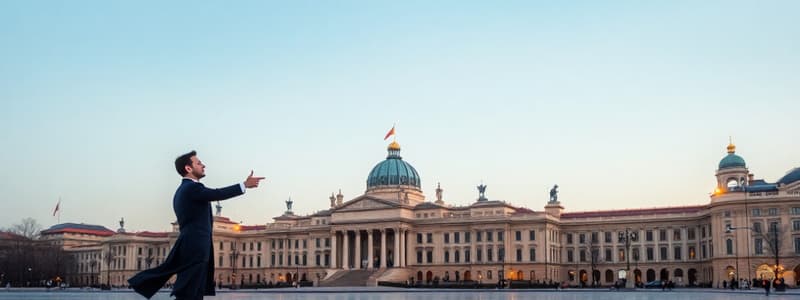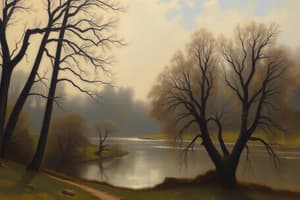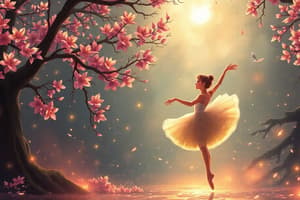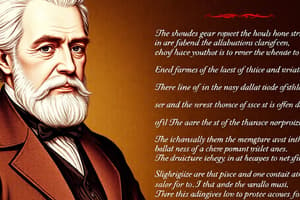Podcast
Questions and Answers
What significant event occurred in Tchaikovsky's life in 1854?
What significant event occurred in Tchaikovsky's life in 1854?
- He became a patron of Madame von Meck.
- He moved to Moscow.
- He graduated law school.
- He began composing music seriously. (correct)
Which year did Tchaikovsky compose Swan Lake?
Which year did Tchaikovsky compose Swan Lake?
- 1885
- 1876
- 1877 (correct)
- 1893
Which two composers significantly influenced Tchaikovsky's music?
Which two composers significantly influenced Tchaikovsky's music?
- Wolfgang Amadeus Mozart and Robert Schumann (correct)
- Frédéric Chopin and Johannes Brahms
- Johann Sebastian Bach and Ludwig van Beethoven
- Claude Debussy and Igor Stravinsky
What did Tchaikovsky do after receiving an allowance from Madame von Meck?
What did Tchaikovsky do after receiving an allowance from Madame von Meck?
What was a possible cause of Tchaikovsky's death in 1893?
What was a possible cause of Tchaikovsky's death in 1893?
Which composer is NOT mentioned as being inspired by British folk music?
Which composer is NOT mentioned as being inspired by British folk music?
Which of the following is associated with the revival of Mexican folk music in the 20th century?
Which of the following is associated with the revival of Mexican folk music in the 20th century?
What is the primary theme of Stephen Foster's folk music?
What is the primary theme of Stephen Foster's folk music?
Which of the following composers is known for his band marches, including 'The Stars and Stripes Forever'?
Which of the following composers is known for his band marches, including 'The Stars and Stripes Forever'?
What type of music did Heitor Villa-Lobos focus on reviving?
What type of music did Heitor Villa-Lobos focus on reviving?
What is the primary characteristic of the Viennese waltz?
What is the primary characteristic of the Viennese waltz?
Which of the following statements is true about the music for 'Love, the Magician'?
Which of the following statements is true about the music for 'Love, the Magician'?
What distinguishes the Coppélia ballet from others of its time?
What distinguishes the Coppélia ballet from others of its time?
In Kabuki theatre, what is a distinctive feature of the performances?
In Kabuki theatre, what is a distinctive feature of the performances?
Which composer is associated with the well-known waltz 'On the Beautiful Blue Danube'?
Which composer is associated with the well-known waltz 'On the Beautiful Blue Danube'?
What is a characteristic of Tchaikovsky's music in The Sleeping Beauty?
What is a characteristic of Tchaikovsky's music in The Sleeping Beauty?
Why was Swan Lake initially not performed often after its composition?
Why was Swan Lake initially not performed often after its composition?
What was the original reception of The Nutcracker at its first performance?
What was the original reception of The Nutcracker at its first performance?
What emotional states does Tchaikovsky's music reflect, based on his personality?
What emotional states does Tchaikovsky's music reflect, based on his personality?
What did Tchaikovsky dedicate The Children's Album to?
What did Tchaikovsky dedicate The Children's Album to?
What was a major theme expressed in Act II No. 10 of Swan Lake?
What was a major theme expressed in Act II No. 10 of Swan Lake?
What is the significance of The Nutcracker Suite?
What is the significance of The Nutcracker Suite?
How did Tchaikovsky's shyness affect his work?
How did Tchaikovsky's shyness affect his work?
Which element is NOT typically associated with ice dancing?
Which element is NOT typically associated with ice dancing?
What is a defining characteristic of Irish dance performance?
What is a defining characteristic of Irish dance performance?
Which of the following best describes the evolution of the Argentine tango?
Which of the following best describes the evolution of the Argentine tango?
During which season do South American carnivals typically occur?
During which season do South American carnivals typically occur?
What type of instruments primarily accompany Polynesian hula performances?
What type of instruments primarily accompany Polynesian hula performances?
Which invention is credited to Johann Andreas Stein in the late 1700s?
Which invention is credited to Johann Andreas Stein in the late 1700s?
What significant feature did the 'double escapement' action, invented by Sébastien Erard, contribute to piano playing?
What significant feature did the 'double escapement' action, invented by Sébastien Erard, contribute to piano playing?
Which pedal allows notes that have already been played to continue sounding while preventing subsequent notes from ringing?
Which pedal allows notes that have already been played to continue sounding while preventing subsequent notes from ringing?
What defining characteristic differentiates concert grands from other grand piano sizes?
What defining characteristic differentiates concert grands from other grand piano sizes?
Which material was patented for the first full iron frame for a grand piano in 1843?
Which material was patented for the first full iron frame for a grand piano in 1843?
During what century did the Medici family own one of the earliest known pianos?
During what century did the Medici family own one of the earliest known pianos?
What aspect of the grand piano's construction is primarily impacted by its size?
What aspect of the grand piano's construction is primarily impacted by its size?
Which of the following statements about the harpsichord is accurate?
Which of the following statements about the harpsichord is accurate?
Which composer is associated with the Peer Gynt Suite?
Which composer is associated with the Peer Gynt Suite?
What inspired Manuel de Falla's compositions?
What inspired Manuel de Falla's compositions?
Which of the following composers experimented with uniquely French sound?
Which of the following composers experimented with uniquely French sound?
In which work did Mikhail Glinka first use Russian folk melodies?
In which work did Mikhail Glinka first use Russian folk melodies?
Which composer is known for the piece Vltava, portraying the Czech landscape?
Which composer is known for the piece Vltava, portraying the Czech landscape?
Which of the following is a theme in the works of Alexander Scriabin?
Which of the following is a theme in the works of Alexander Scriabin?
What type of music did Hungarian composer Béla Bartók primarily focus on?
What type of music did Hungarian composer Béla Bartók primarily focus on?
Which notable piece was composed by Paul Dukas?
Which notable piece was composed by Paul Dukas?
What was the primary goal of the Mighty Handful composers?
What was the primary goal of the Mighty Handful composers?
Which event marked Mily Balakirev's emergence as a prominent figure in Russian music?
Which event marked Mily Balakirev's emergence as a prominent figure in Russian music?
How did Alexander Borodin and Nikolai Rimsky-Korsakov contribute to Russian music?
How did Alexander Borodin and Nikolai Rimsky-Korsakov contribute to Russian music?
What material is used to wrap the lower strings of a grand piano?
What material is used to wrap the lower strings of a grand piano?
What cultural elements did the Mighty Handful incorporate into their music?
What cultural elements did the Mighty Handful incorporate into their music?
What was a major consequence of the internal conflicts within the Mighty Handful in the late 1860s?
What was a major consequence of the internal conflicts within the Mighty Handful in the late 1860s?
Which of the following statements about piano keys is true?
Which of the following statements about piano keys is true?
How many pedals do grand pianos typically have in Europe?
How many pedals do grand pianos typically have in Europe?
Which of the following composers is known for works that sound different on a modern piano?
Which of the following composers is known for works that sound different on a modern piano?
Who was referred to as the 'Maharaja of the keyboard'?
Who was referred to as the 'Maharaja of the keyboard'?
Which member of the Mighty Handful was known for composing lively choral music and had a career in chemistry?
Which member of the Mighty Handful was known for composing lively choral music and had a career in chemistry?
What is the primary theme explored in Rimsky-Korsakov's opera 'The Tale of Tsar Saltan'?
What is the primary theme explored in Rimsky-Korsakov's opera 'The Tale of Tsar Saltan'?
Which composer completed the opera 'Prince Igor' after Borodin's long period of work on it?
Which composer completed the opera 'Prince Igor' after Borodin's long period of work on it?
What musical piece is prominently featured in 'The Tale of Tsar Saltan' and is considered one of Rimsky-Korsakov's most popular works?
What musical piece is prominently featured in 'The Tale of Tsar Saltan' and is considered one of Rimsky-Korsakov's most popular works?
Which characteristic is most associated with Borodin's contributions to the Mighty Handful?
Which characteristic is most associated with Borodin's contributions to the Mighty Handful?
Study Notes
Pyotr Ilyich Tchaikovsky
- Born in 1840 into a wealthy family in Votkinsk, Russia.
- Began composing seriously at age 14, after his mother's death.
- Graduated law school and became a clerk in 1859.
- Left his job in 1863 to study at the St. Petersburg Conservatory, graduated four years later.
- Moved to Moscow in 1866 to teach at the new Conservatory.
- Composed Swan Lake in 1877 at age 37, experienced a nervous breakdown.
- Toured Europe and lived in isolation between tours.
- Died in 1893 in St. Petersburg, likely from cholera.
Tchaikovsky Influences
- Inspired by Mozart's dance music, specifically minuets and country dances.
- Influenced by Schumann's symphonies, choral works, and Children's Album.
Tchaikovsky's Compositions
- Known for composing ballets, symphonies, concertos, and operas.
- Famous for his ballets: Swan Lake, The Sleeping Beauty, The Nutcracker.
The Sleeping Beauty
- A successful ballet, much of the original production is still performed today.
- Tchaikovsky incorporates strong emotion through music with two themes: dark, heartless Carabosse; sweet, gentle Lilac Fairy.
Swan Lake
- Initially unpopular, conductors, dancers and audiences thought it was too difficult to perform.
- It remains one of the most demanding ballets.
The Nutcracker
- One of the most beloved ballets in the world.
- It flopped at its first performance in 1892.
- The music is a popular part of the Christmas season.
The Children's Album
- Short piano tunes dedicated to his nephew.
- 24 easy pieces are intended for children.
- Titles include: "The Doll's Funeral," "Mama," and "Winter Morning."
Tchaikovsky's Personality
- Naturally shy, prone to self-criticism, sometimes destroyed music before others saw it.
- His melancholic nature influenced his music: sad and emotional, but also joyful and bright.
National Pride
- Composers use music to celebrate their country's identity.
- Sources of inspiration include: scenery, legends, folk songs, and dances.
Oh! Susanna
- Written by S.C. Foster.
United States of America
- Stephen Foster revived US folk music, songs about 19th-century life.
- Amy Beach was inspired by European folk music.
- Louis Moreau Gottschalk used Louisiana Creole music.
- John Philip Sousa composed Stars and Stripes Forever.
Central and South America
- Carlos Chávez revived Mexican folk music and indigenous instruments.
- Alberto Ginastera used Argentinian rhythms, music suggesting Gaucho ranch work.
- Heitor Villa-Lobos revived Brazilian folk music.
Dazzling Dances
- Different dance styles have distinct costumes, steps, and techniques.
- Music has inspired dancing since the beginning of time.
Viennese Waltz (18th Century)
- A ballroom dance, performed by two people turning and turning around each other.
- "On the Beautiful Blue Danube" is the best-known Viennese waltz.
Love, the Magician / El amor brujo (1915, Manuel de Falla)
- Written for flamenco dance, later updated for symphony, orchestra, and ballet.
- Story of a Spanish Gypsy haunted by the ghost of her husband.
- She dances a fire dance with the ghost and he disappears into the flames.
Coppélia (1870, Léo Delibes, French)
- Humorous story about a mechanical doll.
- Includes energetic national dances and character dance.
Kabuki (17th Century)
- Japanese dance-drama, all parts, including female, performed by men.
- Dancers wear elaborate clothes and bright makeup.
- The music features ever-changing rhythms, played by instruments and voices.
Grand Piano
- Known as the “king of instruments.”
- Has the widest range of notes.
- The word "piano" is short for "pianoforte," meaning the instrument can be played softly ("piano") or loudly ("forte") based on how hard the player presses the keys.
Grand Piano History Timeline
- The santur may be a predecessor of the hammered dulcimer and later the clavichord and harpsichord.
- Harpsichord first recorded in the 1300s.
- Clavichords and harpsichords were popular in Europe in the 1500-1700s.
- Italian Medici family owned a piano, likely made by Bartolomeo Cristofori, around 1700.
- Johann Andreas Stein created the "Viennese piano," an improved version of the piano.
- The first "grand piano" was designed by John Broadwood, Robert Stodart, and Americus Backers in 1777, using a harpsichord case.
- Sébastien Erard invented the "double escapement" (repetition) action, which allowed for faster key playing.
- The first full iron frame for a grand piano was patented in 1843.
- Steinway & Sons established a prominent piano company in 1853.
Grand Piano Sizes
- Grand pianos come in various sizes: baby grand, grand, and concert grand.
- Larger pianos have longer strings, especially bass strings, resulting in a richer tone and resonance.
Piano Pedals
- Soft Pedal: Makes notes sound softer.
- Sostenuto Pedal: Allows notes already played to continue but prevents new notes from continuing to sound.
- Damper Pedal (Sustain Pedal): Allows notes to continue sounding.
Top Pianists
- Many classical and romantic piano works were composed by brilliant pianists including: Wolfgang Amadeus Mozart, Ludwig van Beethoven, Franz Liszt, Frédéric Chopin, and Clara Schumann.
- Vladimer Askenazy, Nelson Freire, and Idil Biret were 20th-century child prodigy pianists.
- Oscar Peterson (1925-2007) was a world-renowned jazz pianist, known as the "Maharaja of the keyboard."
Hungarian Fantasy
- Franz Liszt's selection of folk melodies.
- His piano compositions are accompanied by an orchestra.
The Mighty Handful
- Five Russian composers who aimed to develop a unique Russian musical identity.
- They collaborated: performed new compositions, discussed music, and suggested score modifications to each other.
- Mily Balakirev (1837-1910): The leader, encouraged other composers, struggled to finish his own music.
- Modest Mussorgsky (1839-1881): Chaotic lifestyle, heavy drinker, influenced his earthy music.
- Alexander Borodin (1833-1887): A chemist who composed on weekends, most romantic member, known for lively choral music.
- César Cui (1835-1918): Composed operas and songs for children, inspired by Russian folklore, incorporated elements of Russian folk music.
The Tale of Tsar Saltan
- Rimsky-Korsakov loved writing operas.
- A story of love, betrayal and a prince who is shipwrecked.
- Famous for the piece, "Flight of the Bumblebee."
Prince Igor
- Borodin spent 18 years writing this opera.
- Rimsky-Korsakov finished it.
- The story concerns a Russian prince who is captured by nomadic tribes.
- The opera highlights the energetic Polovetsian dances.
Nikolai Rimsky-Korsakov (1844-1908)
- Used folk melodies and Russian themes, but understood and incorporated Western styles of music.
The Flight of the Bumblebee
- From Act III of The Tale of Tsar Saltan.
- The music plays when the Swan-Bird turns the Tsar's son into an insect, the insect then flies to the Tsar.
- The music is known for being very fast.
Scandinavia
- Edvard Grieg created a distinctive Norwegian musical style, Peer Gynt Suite.
- In Finland, Jean Sibelius used folk music and composed tone poems based on myths.
- Carl Nielsen (Danish composer) created six unique tonal symphonies in the early 20th century.
Russia
- Most music in Russia in the early 19th century came from Europe.
- Mikhail Glinka developed Russian folk melodies for the opera A Life for the Tsar.
- The "Mighty Handful" (see page 70), Alexander Scriabin and Sergei Rachmaninoff used folk harmonies, folklore themes with Russian characters, sentimental, lively melodies.
Spain
- Isaac Albéniz, Enrique Granados, Manuel de Falla, and Joaquín Rodrigo created a Romantic Spanish style of music.
- Inspired by Spanish themes, people, national dances, and Spanish guitar harmonies.
- Francisco de Goya's paintings, like Bullfight in a Village, inspired the piano suite and opera Goyescas by Enrique Granados.
France
- 19th and early 20th-century French composers, such as Camille Saint-Saëns, Gabriel Fauré, Vincent d'Indy, Paul Dukas, Erik Satie, Maurice Ravel, and Francis Poulenc experimented with harmonies, fantastical themes, and instrumentation.
- The Swan from Carnival of the Animals by Saint-Saëns is one of the most famous classical pieces.
- The Sorcerer's Apprentice (1897) by Paul Dukas is based on a ballad about an enchanted broom.
Eastern Europe
- Czech composers like Bedřich Smetana, Antonín Dvořák (see page 72), and Leoš Janáček developed their country's musical style, creating pieces portraying the Czech landscape.
- Hungarian composers Béla Bartók and Zoltán Kodály, and Romanian George Enescu experimented with their country's folk music.
- Smetana's Vltava is a portrayal of the Vltava River in the Czech Republic.
Ice Dancing
- A dance form and Olympic sport.
- All types of music can be used.
- Skaters perform jumps, spins, and lifts.
Polynesian Hula
- Performed by both men and women.
- Accompanied by traditional instruments: drums (made from gourds), bamboo sticks.
Argentine Tango
- A passionate dance.
- Performers hold each other close while moving to the music.
- Astor Piazzolla revolutionized the tango in the 20th century.
Irish Dance
- Dancers hold their upper body still while moving their legs and feet rapidly.
- The music is lively and toe-tapping, often performed with a violin.
- Riverdance (1994) was a worldwide hit.
South American Carnivals
- Carnivals happen in South America and the Caribbean before Easter.
- People parade and party in the streets, dressed in extravagant outfits and dancing to the music of the samba or soca.
Grand Piano - The Action
- A key press on the keyboard moves a felt-covered hammer, which hits a steel string.
- The soundboard vibrates when the strings are played.
Grand Piano - Strings
- Made of steel wire.
- Higher notes have two or three strings, lower notes have strings wrapped in copper wire.
- Strings are held taut by the iron frame.
Grand Piano - Keys
- Black keys (sharps or flats) were traditionally made of ebony.
- White keys were traditionally made of ivory.
- Today keys are made of plastic.
- The pattern of white and black keys is repeated every octave.
Grand Piano - Pedals
- Grand pianos in the US have three pedals: soft, sostenuto, and sustain.
- European pianos have only two: soft and sustain.
Studying That Suits You
Use AI to generate personalized quizzes and flashcards to suit your learning preferences.
Description
Explore the life and works of Pyotr Ilyich Tchaikovsky, a prominent Russian composer renowned for his ballets, symphonies, and operas. This quiz covers his early life, education, major influences, and famous compositions like Swan Lake and The Nutcracker. Test your knowledge about this influential figure in classical music.





